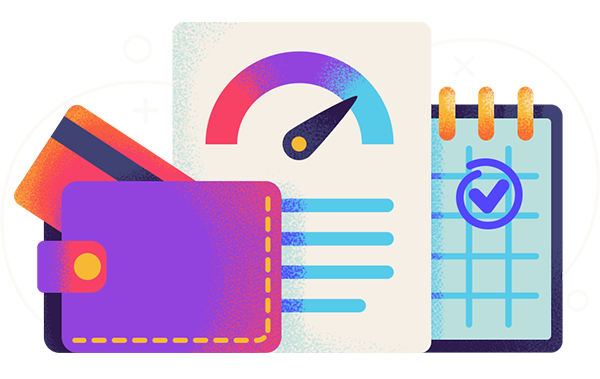Creditworthiness is a measure of how risky a person is as a borrower based on their credit history, income and debts. In general, the more creditworthy you are, the more trustworthy lenders will consider you to be and the more likely you are to be approved for better credit cards and loans.
The easiest way to estimate your creditworthiness is to check your latest credit score, which you can do for free here on WalletHub. Just don’t make the mistake of assuming “creditworthiness” is merely another way of talking about credit scores and reports, because those are far from the only things considered. Below, you can learn more about all the factors that affect creditworthiness.
Factors That Affect Creditworthiness
Although people often refer to creditworthiness and credit scores interchangeably, lenders take a variety of factors into consideration when deciding whether you’re worthy of credit.
Credit Report
When you apply for credit, lenders look at your credit report, which includes information on your loans and lines of credit, such as balances, credit limits and payment history, along with credit inquiries and certain public records.
Credit Score
Creditors may consider your credit score, which is basically a grade for the contents of your credit report, ranging from 300 to 850. You should aim for a score of at least 700, which is “good credit.”
Income
In some cases, high income can compensate for a bad credit score. If you’re making lots of money, your ability to borrow and pay back larger amounts increases, unless you already owe a lot. One comparison lenders usually make is the ratio of your income to your debt. The better that ratio, the better positioned you are for making payments on new debt.
Assets
Assets are any valuable property you own, such as houses, cars or stocks. If your assets have a lot of value, lenders know you can use them to settle debts.
Debts
How much you owe affects how much you can borrow. Not only will debt bring down your credit score in many cases, but it also makes creditors doubt how capable you are of paying them back.
Liabilities
Liabilities are amounts of money that you are obligated to pay in the future. They are not necessarily debts, but rather any agreements that will reduce the amount of money you have later on. Some examples are taxes, monthly bills, or a mortgage.
Product Choice
It’s important to remember that creditworthiness is a relative concept. Just because you are creditworthy enough for one financial product doesn’t mean you’re qualified for another.
For example, even if you have bad credit, you might be considered creditworthy enough to get a secured credit card, since approval depends mainly on your ability to put down a security deposit. At the same time, most lenders wouldn’t consider you creditworthy overall, and you won’t be able to qualify for most other financial products.
Depending on where you start, it may take months or even years to build or rebuild a higher level of creditworthiness.
How Creditworthiness Is Measured
Although creditworthiness encompasses more than just your credit score, that score is still a very good indication of your risk as a borrower. Below, you can see what credit score you’ll need for each tier of creditworthiness.
| Creditworthiness Level | Credit Score |
|---|---|
| Excellent | 750-850 |
| Good | 700-749 |
| Fair / Limited | 640-699 |
| Bad | 300-639 |
Interestingly enough, while 850 is the highest credit score you can get, you can think of yourself as having perfect credit if your score is 800 or higher. Once you join the 800+ club, improving your credit score further probably won’t help you save more money.
But until you reach that point (and even after you get there), you should try to become increasingly responsible in every area of your financial life as your creditworthiness will not be solely based on your credit score. Your income and how you handle your expenses play a role, too. In particular, you need to pay your bills on time.
You can see how good your credit score is right now as well as the best way to improve it moving forward by signing up for a free WalletHub account. In addition to free daily credit scores and reports, WalletHub also offers free personalized credit analysis that will tell you how to improve your score and how long it will take. You can find some helpful tips below, too.
Why Is Creditworthiness Important?
Creditworthiness is important because it affects your financial life in a wide variety of ways, from what financial products you can qualify for to even what jobs you can get. Having bad credit can in turn cost you a lot of money and opportunities.
For example, bad credit can raise the cost of an undergraduate student loan by as much as $48,000, cost you $30,000 extra on a mortgage, more than double your credit card interest rate, and make you shell out over $1,300 extra a year for car insurance, according to a study by Syracuse University.
Creditworthiness plays a role in:
- Approval for loans and lines of credit: The more creditworthy you are, the more loans and lines of credit you’ll be able to qualify for. Each loan or line of credit will have its own minimum requirements you’ll need to meet in order to be approved, such as a minimum credit score and a minimum income.
- The terms of loans and lines of credit: Creditworthiness doesn’t just play a role in approval – it also impacts the terms of those loans. More creditworthy customers can enjoy lower rates and fees, which can save you a lot of money.
- Financing: Creditworthiness affects how much money you can borrow and how long you can borrow it for. On credit cards in particular, it also impacts how long of an introductory 0% APR you can qualify for on purchases or balance transfers. The best offers can save you a ton of money on interest.
- Employment: Some employers may check your credit when you apply for a job. The logic is that if you’re financially responsible, you’ll probably also be responsible in your work, and vice versa.
- Rent: A landlord may assess your creditworthiness in order to determine how likely you are to pay your rent on time each month.
- Insurance: Insurance companies may use your creditworthiness as one factor when determining your risk as a customer, which can affect your premiums.
- Utilities: Utility companies may check your creditworthiness in order to see how likely you are to pay on time. They might require a deposit or a guarantee that someone else will pay your bills if you have a history of late payments on credit.
The bottom line is that increasing your creditworthiness is key because it shows you’re financially trustworthy, both to people you’re trying to borrow money from and to people who might want to hire you or provide you with services.
How to Improve Your Creditworthiness
To improve your creditworthiness, you need to pay your bills on time, limit how much of your credit you actually use, build a long credit history, minimize new credit inquiries and monitor your progress. Following these five easy steps can greatly improve your financial future.
1. Automate your payments.
Missing a payment, whether on a credit card or a loan, adds negative information to your credit report and brings down your credit score. Setting up automatic billing ensures you’ll never be late on a payment.
2. Keep your credit utilization low.
Using too much of your credit limits signals to lenders you are stretched thin financially. Aim to keep a credit utilization ratio below 30%.
3. Avoid closing unused accounts.
When you close unused accounts, it lowers the total available credit you have across all of your accounts. As a result, closing accounts can cause your credit utilization ratio to increase, in addition to potentially shortening the length of your credit history in the eyes of future lenders.
Both of these things could negatively affect your credit score. It’s worth keeping an account open, especially if there’s no annual fee, just for the positive account information that is sent to the credit bureaus.
4. Don’t open new accounts too often.
Applying for new credit cards too often tells lenders you are desperate to borrow. If you apply for a card and get rejected, consider waiting at least 6 months before applying for another card.
5. Check your credit report and score.
Checking your credit report and credit score often can help you spot and fix errors quickly. You can check both for free on WalletHub.
To learn more, check out WalletHub’s guide on how to improve your credit score.



WalletHub experts are widely quoted. Contact our media team to schedule an interview.